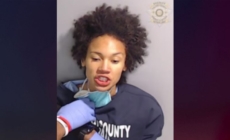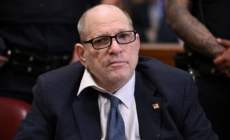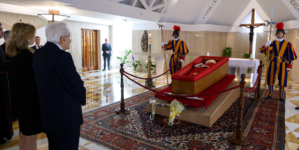-
Trump says he has “no intention of firing” Federal Reserve chief Jerome Powell - 6 mins ago
-
Man sentenced for sexually assaulting incapacitated 16-year-old, recording it, and sending her the video - 24 mins ago
-
Ohio State QB Will Howard's Highlights from 2024 Season | CFB on FOX - 28 mins ago
-
The Next Pope: Where Candidates Stand on Scale From Liberal to Conservative - 39 mins ago
-
More Americans teetering on the edge of bankruptcy. Here’s why. - 45 mins ago
-
Meghan Markle hit with plagiarism claims by British children’s author - 48 mins ago
-
Ga. mom who drowned 1-year-old daughter in pond found not guilty by reason of insanity - about 1 hour ago
-
Updated list of Jacksonville Jaguars 2025 NFL Draft picks entering draft week - about 1 hour ago
-
Trump Admin Sets Deadline for Eliminating 8 Petroleum-Based Food Dyes in US Foods - about 1 hour ago
-
As Tesla’s sales and profit tumble, investors ask Elon Musk to ditch DOGE and return to automaker - about 1 hour ago
France prepares for largest child abuse trial in its history
PARIS — Amélie Lévêque remembers the moment when she finally understood the unexplained bouts of depression and other disorders that had tormented her for more than two decades.
Now 42, she connected the dots in 2019 when she saw a report about a surgeon under investigation on suspicion of sexually assaulting patients over three decades and meticulously cataloging the abuse in digital diaries.
Lévêque was 9 years old when her appendix was removed by the surgeon.
“Immediately I knew, voilà, that’s what happened to me,” Lévêque told AFP. “This explained so many strange things in my life, like my phobia of hospitals, my eating disorders … a life suspended since my operation.”
Lévêque is set to testify at France’s largest-ever child sex abuse trial, which opens Monday in Vannes, a picturesque town in coastal Brittany. Former surgeon Joël Le Scouarnec, 74, is charged with raping or sexually assaulting 299 victims over three decades, most of them girls and boys under 15 whose average age was 11.
Many victims have said they don’t remember being assaulted and experienced similar symptoms to Lévêque’s, their lawyers said. Others suffered sexual dysfunction and fell into substance abuse. When police, taking names from Le Scouarnec’s writings, sought them out and showed them the passages written about them, those revelations triggered physical and psychological reactions of varying degrees, the lawyers added. Two men, both 25, died by suicide in 2020 and 2021.
The case, which includes a dark history of incest, has raised questions about how a well-respected surgeon who worked in nine hospitals and clinics across five regions in northwest France was allowed to practice when there were so many red flags that legal observers say should have signaled that Le Scouarnec was dangerous, including a 2005 conviction for possessing material depicting child sexual abuse.
Le Scouarnec’s lawyers declined to comment, but prosecutors said he has admitted to many, but not all, of the charges. Unlike in the United States, defendants in France are brought to trial even if they admit guilt.
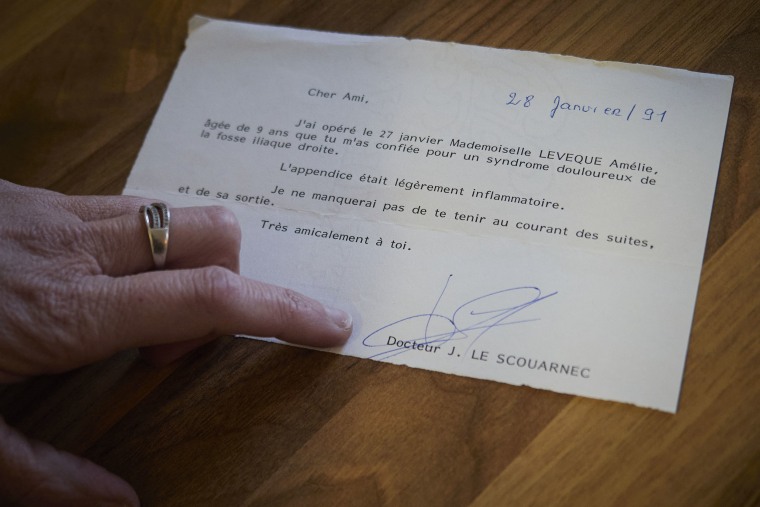
Victims’ advocates hope the trial, set to last four months, will prompt a hard look at what they call a lax pursuit of child abuse allegations, particularly when doctors — who are in short supply in many areas — are accused of misconduct.
“There were warnings over 30 years,” said Francesca Satta, who is representing 10 victims and families. “This man benefited from a system that opened the door for him to have his own hunting ground.”
‘Pedophile fantasies’
Beyond the medical world, the lines have often blurred in France over what constitutes child abuse versus seduction. The once-celebrated writer Gabriel Matzneff, now 88, made having sex with adolescents a staple of his books, even boasting about the practice in an infamous TV interview, until a leading literary publisher, Vanessa Springora, called him out in her own 2020 book for grooming her for sex in the 1980s when she was 14 and he was 50.
It is illegal for an adult to have sex with a minor under the age of 15, though child advocates say many adults are never charged. Earlier this month, in a closely watched case seen as a test of evolving attitudes toward sex with minors, the director Christophe Ruggia was convicted of sexually assaulting actress Adèle Haenel, now 35, from the time he cast her in a film when she was 12 and he was 36. He was sentenced to two years of house arrest, with two years suspended.
“L’Affaire Scouarnec” has drawn parallels with another high-profile trial that transfixed the country late last year and led to the conviction of Dominique Pelicot, 72, for organizing and documenting the mass rape of his sleeping wife, whom he drugged, by dozens of men over a decade. He is now under investigation for two other alleged crimes involving drugging: the rape and murder of a young woman in 1991 and the attempted rape of another in 1999.
As in the Pelicot case, investigators discovered a trove of allegedly incriminating evidence on hard drives seized in the suspect’s house, including thousands of photos depicting child sexual abuse and videos, many of them violent, French media reported.
Le Scouarnec allegedly told investigators he was “obsessed and tyrannized” by his “pedophile fantasies” and began keeping a diary, according to court documents. Those digital files date to the early 1980s and include the names of patients and others, including young family members, along with their ages, addresses and a detailed account of what was done to them, the documents show.
The assaults tracked in the digital diaries stop in March 2017, when Le Scouarnec was arrested on charges of raping his 6-year-old neighbor after luring her across a gap in the mesh fence between their gardens, according to testimony. In December 2020, he was convicted in that case, along with the rape and sexual assault of two of his nieces when they were children in the 1980s and ’90s, and a 4-year-old patient.
Le Scouarnec faces a maximum of 20 years in prison, which would run concurrently with the 15 years he is now serving in connection with the 2020 conviction. With his pretrial detention and parole eligibility taken into account, he could be out by 2030, said lawyer Marie Grimaud.
Grimaud, who is representing 37 victims, and other lawyers say the penalties for sex crimes and child abuse should be much more severe.
“In France, if you rape one person, you rape 300, it’s exactly the same number of years you’re looking at,” she said.
Warning signs
The first people who knew about Le Scouarnec’s behavior were his family. As early as 1984, references to the rapes of a niece and a family friend appear in the surgeon’s diaries, according to court documents. But none of the adults took action, even after the children told them, and the abuse continued, three family members told NBC News.
“This is a man who sees children as sexual objects,” Le Scouarnec’s niece Alexandra, 47, told NBC News. She said her uncle isolated her and then raped her from ages 5 to 13. (NBC News does not name victims of sexual assault, but Alexandra has asked that her first name be used.)
She said she will testify at the upcoming trial, along with a family friend who was also one of the first victims mentioned in the diaries, though Le Scouarnec cannot be charged in their cases because the acts happened too long ago under French law.
Some children knew Le Scouarnec’s “exam” was not appropriate, but their parents brushed aside their complaints, said Hugo Lemonier, a journalist who spent three years researching a new book about the case, “Trapped: In the Intimate Diaries of Dr. Le Scouarnec.”
“What we see in this case is the omnipotence of the medical profession,” he said.
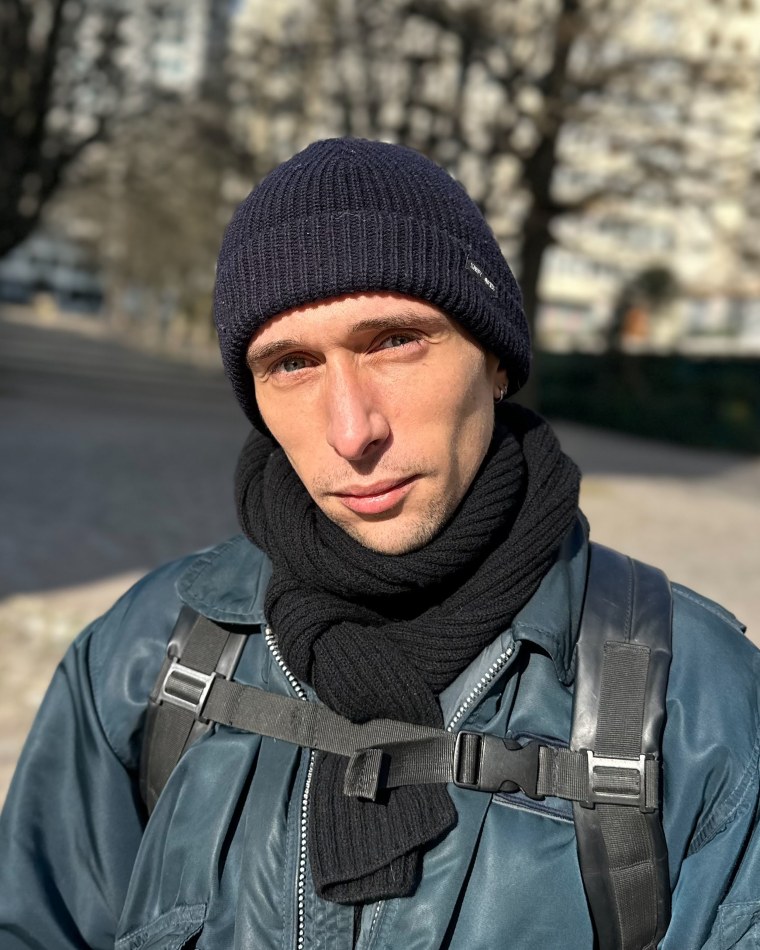
French authorities were first alerted in January 2004, when the FBI told them Le Scouarnec’s credit card was linked to a pedophile website the agency was monitoring, court records show. There is no indication that medical authorities were notified as the police carried out their investigation.
At his trial for possession of child sexual abuse material in the fall of 2005, the surgeon was “almost considered a victim,” Lemonier said. Le Scouarnec presented himself as a man “in a moment of great distress,” recounting how his wife had left him, taking their three kids, and in his solitude he “found a refuge, an escape” in viewing the material, he added.
The surgeon, who specialized in appendectomies and abdominal and gynecological surgery, got a break when the judge imposed a four-month suspended sentence with no restrictions.
“The judge could have ordered him to stop practicing or seek treatment, but he didn’t,” said Homayra Sellier, founder of the child protection agency Innocence in Danger. “He should have lost his medical license.”
Another opportunity was missed in June 2006, when a psychiatrist at the hospital where Le Scouarnec worked in Quimperlé, on the southern coast of Brittany, learned about his conviction and wrote a letter alerting the hospital director, who passed it along to the local medical board and ordered the surgeon to be accompanied whenever he was with minors, according to France Info.
‘A nutcase in Brittany’
The local medical board requested a copy of the conviction, but it took the prosecutor’s office five months to send it, which was then forwarded to state authorities, Lemonier said. “After that, they washed their hands of it.”
Back at the hospital, the order requiring the surgeon to be shadowed was never carried out, and Le Scouarnec, whose modus operandi was to isolate victims under the guise of examining them, would go on to abuse at least 54 more victims from 2004 to 2017, all of whom are part of the current case, Lemonier said.
Not all of the victims in the diaries have been pursued by investigators, he said, adding that according to his count the total could top 400.
“It’s a chain of failures where nobody wanted to take responsibility,” Lemonier said. “The police, the courts, the medical association, the hospitals, the health authorities and the state are all responsible.”
The hospital director, André Labat, died in 2013. The current administration declined to comment when contacted by NBC News, as did all of the boards that could have imposed sanctions or revoked Le Scouarnec’s medical license, including the local and regional medical boards and the regional health agency. The national Health Ministry did not respond to requests for comment. The local branch of the national police referred questions to the national police press office, which also did not respond.
“The French authorities were warned that we had a nutcase in Brittany,” said lawyer Maud Touitou, who represents eight victims. She called local oversight boards “barons” that “revel in their provincial social status, who have no other goal but to continue to have and exercise their little power.”
In June 2008, Le Scouarnec moved to a hospital in Jonzac, about five hours’ drive south, where he was considered the “wise man” on staff, Le Monde reported. The hospital’s former director, Michèle Cals, told police in 2017 that she didn’t take “any special measures” when the surgeon told her about his conviction because there had been “no physical aggression,” according to Radio France, which counted more than 20 victims at the Jonzac hospital. Cals could not be reached for comment, and the Jonzac hospital declined to comment.
Children’s advocates are hoping the trial will prompt sweeping changes beyond tougher laws. They are hoping that the accounts of victims will be given greater credence.
For the victims, who have waited nearly eight years since the investigation began to tell their stories — some have waited decades — the trial represents a chance to heal.
“The only fear they have is that the entire trial will focus on Le Scouarnec,” Grimaud said.
“They want to be recognized.”
Linda Hervieux reported from Paris, and Gabrielle Nolin from London.
If you are a child being abused, or know a child who may be facing abuse, call the Childhelp National Child Abuse Hotline at (800) 422-4453, or go to www.childhelphotline.org. States often have child abuse hotlines, but if you suspect a child’s life is in imminent danger, call 911.
If you or someone you know has been sexually assaulted, call the National Sexual Assault Telephone Hotline at 1-800-656-4673. The hotline, run by the Rape, Abuse, & Incest National Network (RAINN), can put you in contact with your local rape crisis center. You can also access RAINN’s online chat service at https://www.rainn.org/get-help.
Source link






